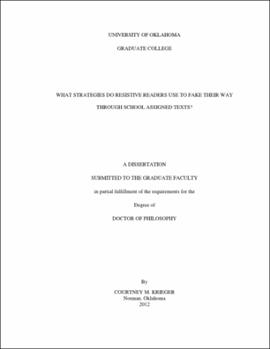| dc.contributor.advisor | Angelotti, Michael | |
| dc.creator | Krieger, Courtney Machelle | |
| dc.date.accessioned | 2019-04-27T21:36:54Z | |
| dc.date.available | 2019-04-27T21:36:54Z | |
| dc.date.issued | 2012 | |
| dc.identifier | 99344333102042 | |
| dc.identifier.uri | https://hdl.handle.net/11244/319159 | |
| dc.description.abstract | A trend among adolescent readers is the practice of fake-reading. Fake-reading occurs when students who can read choose not to, and develop strategies to fake their way through school-assigned texts to earn good grades. This study examines four resistive readers, or fake-readers, assigned to read Neal Shusterman's Unwind (2007) and complete an Unwind Multiliteracy Project related to the book. Resistive readers admit to using four main strategies: skimming (scanning in lieu of reading), ripping (using online summaries as test and essay preparation), mooching (getting information needed through conversations with friends), and schmoozing (getting information needed through informal chats with the teacher and in-class discussion). Implications for promoting reading engagement among fake readers are discussed. | |
| dc.format.extent | 154 pages | |
| dc.format.medium | application.pdf | |
| dc.language | en_US | |
| dc.relation.requires | Adobe Acrobat Reader | |
| dc.subject | Teenagers--Books and reading | |
| dc.subject | Reading (Secondary) | |
| dc.subject | Deception in adolescence | |
| dc.subject | Reading, Psychology of | |
| dc.subject | Motivation (Psychology) in adolescence | |
| dc.title | WHAT STRATEGIES DO RESISTIVE READERS USE TO FAKE THEIR WAY THROUGH SCHOOL ASSIGNED TEXTS? | |
| dc.type | text | |
| dc.type | document | |
| dc.thesis.degree | Ph.D. | |
| ou.group | Jeannine Rainbolt College of Education::Department of Instructional Leadership and Academic Curriculum | |
